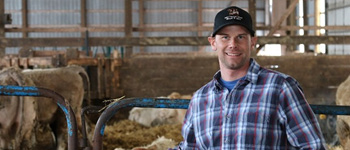From the end of his cattle barn, Brett Francis views the snowy fields of his family farm that in a short time will be ready for spring planting. He and his family are keenly aware of the climate challenges that many farmers are facing head-on. Brett, along with his family and parents, operate Francis Farms, a multigenerational mixed farm in central Prince Edward Island. The farm has a beef cow calf and feedlot operation and also grow seed potatoes, corn, soybeans, hemp and feed grasses.
"In the past five years, we're having more major storms and severe drought, than my father David has ever seen before," says Brett.
After major hurricanes, the farm saw their feed corn flattened and rain-soaked, while tripling their harvesting expenses. This year they chose to explore wind resistant varieties for corn and are planting more grass instead for cattle feed. Increasingly dry summers are also causing concern with their potato crops.

Francis Farms have always taken pride in being ahead of curve for sustainable farming practices, but with extreme weather events becoming more frequent, Brett is always on the lookout for new opportunities.
"I heard about Agriculture and Agri-Food Canada's On-Farm Climate Action Fund (OFCAF) from a friend who operates a dairy farm in Nova Scotia. He urged that, 'I have to look into it'," says Brett.
The first thing that jumped out to Brett was the cover crop funding — his father is a big advocate for cover cropping and has used this practice for the past 25-to-30 years. Prince Edward Island soil is highly susceptible to wind and water erosion from rain and melting events. Cover crops reduce erosion, and help fields keep valuable topsoil that is rich in organic matter, making the soil more fertile and resilient to extreme weather conditions. Additionally, cover cropped soils can reduce nitrogen from leaking or leaching into groundwater and reduce nitrous oxide, a greenhouse gas, from going into the atmosphere.
After applying for OFCAF funding through the PEI Federation of Agriculture, Brett received funding to plant cover crops on a lot more farm acreage than usual, including all fall tillage acres for the first time ever. Before tapping into OFCAF funding, Francis Farms were cover cropping about 50% of their fields and now are close to 100% coverage.
"It's incredible to have OFCAF funding available for cover cropping. They take a lot of time and money, and it's not a 'get paid today' practice, but the payoff down the road is immensely positive for the farm and the environment."
Brett credits the team effort from Agriculture and Agri-Food Canada (AAFC), the PEI Federation of Agriculture, and the PEI Department of Agriculture for help with funding and support for submitting an application. He hopes that with OFCAF, more farmers can take advantage of available funding to adopt more sustainable farm practices.
"OFCAF is a great cost share between the government and farmers. Everybody needs to eat so it's everyone's responsibility to take care of their food and environment."
Learn how to apply to the On-Farm Climate Action Fund.
Get more Agri-info
- Want more stories like this? Explore what else Agri-info has to offer.
- Interested in reporting on this story? Contact AAFC Media Relations at aafc.mediarelations-relationsmedias.aac@agr.gc.ca to arrange an interview with one of our experts.